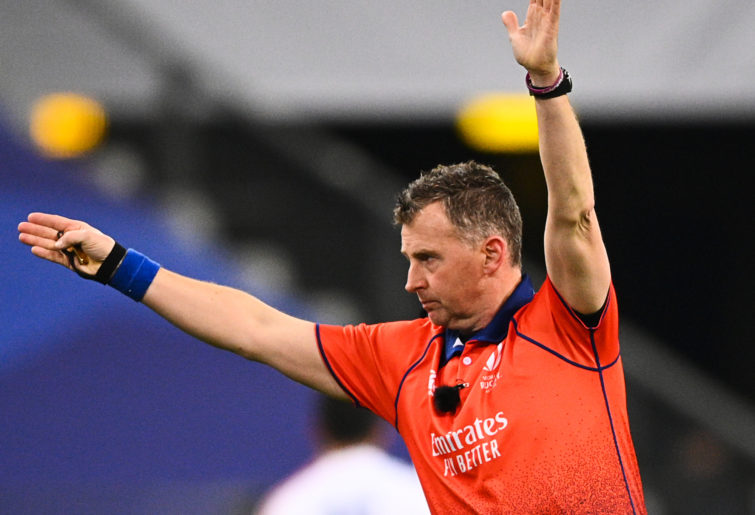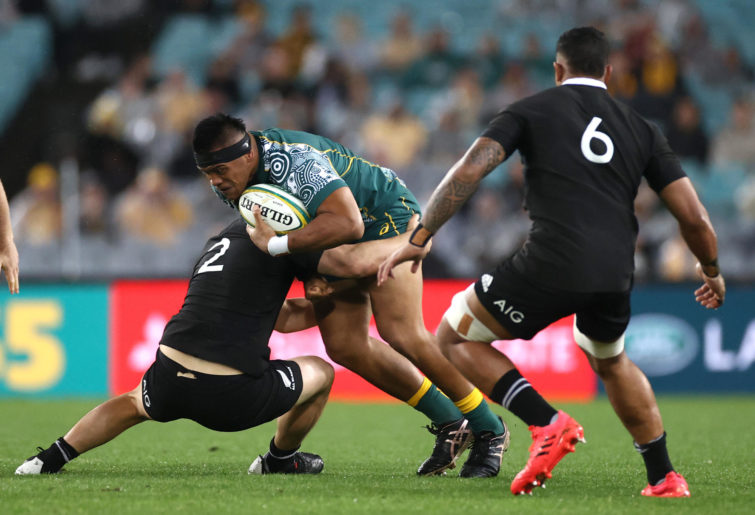Our game is at a crossroads.
No, we are passed that. We are charging headlong into a very narrow, restrictive cul-de-sac and rapid U-turn is required.
Post-COVID-19, our national associations and clubs will be indebted like never before, sponsorship and entertainment dollars are scarce and competitive, and all at the very time that the flagship of our sport, the international game, has become almost unwatchable for both the purist and the occasional viewer.
The appointments of Joe Schmidt and Joël Jutge, as World Rugby’s director of rugby and high performance and head of match officials respectively, are welcomed with expectant enthusiasm as it lies within their very remit to redirect our sport onto an acceptable path.
Without repair to how the game is played, we can forget about remedying the balance sheet issues and competing in the sponsorship and television markets with any vigour. Imagine the debrief at Amazon Prime when the executive who recommended buying the turgid autumn international series defends his/her decision before their board.
There is no need to quote endless statistics at you when you know from your own eyes and the feeling in the pit of your stomach how far our game has strayed from its ethos. But when a game between two southern hemisphere nations has 40 set-pieces, 30 penalties and 60 kicks from hand and the Autumn Nations Cup final has over 100 kicks in general play, it is clear we have a major issue.
The trend has been gathering pace since the 2015 Rugby World Cup onwards as we allowed the officiating of our sport to get further and further from the law book as written, as interpretation (however that is defined) and a misguided belief that letting the game ‘flow’ would improve the product, when it simply has not.
It is not what is being refereed that it is the issue, it is the how.
Rewriting the laws will make zero difference if the officiating ignores both the letter and the spirit of them. The lawbook is already fit for purpose, it is the deviation from both the laws and the spirit of the sport which drove us to where we are now.
Given it has been a slow decline away from the laws, the path back needs to be both methodical and resolute, and I proffer the following for your consideration.
1. All international referees are to be centrally contracted to World Rugby as their primary employer
They are to be directed and evaluated from this source only and will referee in a consistent manner no matter their domestic affiliations or international competition appointments. This panel of referees will be evaluated in the same manner, be they officiating Southland versus Manawatu or England versus France.

(Former) referee Nigel Owens. (Photo by ANNE-CHRISTINE POUJOULAT/AFP via Getty Images)
Elite players and coaches need the confidence of consistency of refereeing approach to support their game plans. Rankings referees in terms of merit order and performance should be published. Elite performance comes with scrutiny.
2. It’s time to be ruthless on the little things that are already in the Law Book and bring immediate change
For too long we have let many small law aspects of our game slide. I would enforce the following with vigour, re-establishing some rigour and discipline in the player-official relationship.
- Five seconds to play the ball in the ruck, not five seconds from when it has been placed by three rolls of the halfback foot to the back of an extended chain. Seeing the Fiji halfback’s face when he was called for this in the Georgia game recently was priceless.
- Sixty seconds to take a penalty kick for goal once indicated.
- Any penalty kicks from hand taken in front of the mark are to be reversed. We regularly see kickers taking one- to two-metre liberties. Quite a distance when the resultant lineout is that much closer to the try-line
- Any player in front of the kicker in general play cannot move, not a single step, until they have been put onside. Beginning the chase early, in front by a single step means it is easier to present an unbroken chase line to returning ball carriers – another contributor to the current kick-fest
Simple stuff, already in the laws, all ignored week to week. Enforcement aligns with a theme of reducing the faux rest periods that have been built into our game over recent years and increasing the pace of play. Changing numbers of replacements, for example, should be an option when we have remedied our current issues.
3. The breakdown
I note Mr Schmidt was on the panel that changed breakdown directives earlier this year with positive intent and suspect that the outcomes at international game time were way out in the outer arms of unintended consequences when you discussed its implementation.
The breakdown is the single most important element of our game, a dynamic contest for the ball and right now, a complete and total mess.

(Photo by Cameron Spencer/Getty Images)
The ball carrier must, and must be allowed to, immediately place the ball when tackled. Not squeeze it back under the body or legs, a full arm placement of the ball and then release.
Then, and only then, does the contest for the ball commence:
- If the carrier does not place and release the ball, penalty to the defence
- If the carrier is not allowed to place the ball by the opposition, then penalty to the offence
- The tackler must immediately release and demonstrably roll out of the ruck east/west
Only the ball carrier and tackler can be off their feet in and around the ruck. Offensive cleaners need to stay on their feet like they would at a counter ruck, no missile clear outs, and no defensive flopping on the ball to slow it down
Jacklers are only rewarded when they are demonstrably on their feet and are able to lift the ball vertically with both hands. On your feet does not mean:
- Raking at the ball with one hand
- Wrapping both arms around the body of the tackled player on the ground
- Placing your hands or arms on the ground at any time in playing or before playing the ball
- Placing knees, chest or any body parts on a player already on the ground
Is it really that hard to officiate the breakdown directives as they were intended?
Coming up in part two: the offside line, reducing the faux rest periods in the game, re-establishing the authority of the referee, and ignoring the resistance.































































































